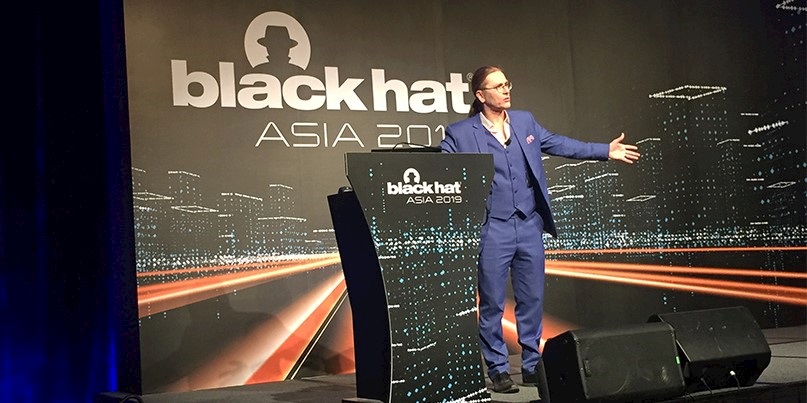F-Secure’s Mikko Hyppönen on the future of warfare in an increasingly connected world

The world is at the beginning of a cyber arms race, F-Secure’s chief research officer Mikko Hyppönen told attendees at Black Hat Asia today.
During his keynote speech, which opened the 10th year of the security conference in Singapore, Hyppönen told how the domains of war – land, air, sea, and space – have expanded into the cybersphere.
We are now seeing a race to develop both offensive and defensive cyber weapons, he warned, as nations across the world look to arm themselves against one another.
“We love war – we keep forgetting the horrors of war every couple of decades, every couple of generations,” he told delegates.
“Wars will be around for future generations and they will be fought in new domains. Right now it’s the five we know, and the arms race is now squarely in the cyberspace.
“In fact, I believe we are in the very beginnings of the cyber arms race. Previous to this was the nuclear arms race that went on for 60 years – and it might very well be that we spend the next 60 years in a cyber arms race.”
Following his speech, Hyppönen told The Daily Swig: “There will be new domains which we can’t imagine yet, just like we couldn’t imagine cyber to be a domain for waging war 30, 40 years ago, but this is where we are right now.”
Hyppönen warned that it won’t just be the world’s major economies or rogue nation states that set out to develop tools to use in the event of cyber warfare.
The US (the world’s biggest investor in cyber weapons), Israel, and the UK are among other countries actively involved.
“Every technologically advanced nation will be creating not just defensive capabilities, but offensive capabilities,” he told The Daily Swig.
“The difference [with other domains] which I discussed at length earlier today is the fact that, in its current form, cyber doesn’t provide us with any sort of deterrence power. Nobody knows about the weapons you have.
“If they go completely unused, they’re just left waiting because eventually the vulnerabilities will be patched, and you spend all the money and no one will ever know you had it.
“Eventually we could see public demonstrations of cyber power. Just like we now see [in] military marches, militaries showing how many tanks they have, we could have some kind of public cyber war games where a nation would show what they can do in order to [invoke] some kind of deterrence.”
Which is worrying, he added, in a world that increasingly depends on computer systems and connectivity to run its critical infrastructure – not just power plants and national grids, but water resources, food production factories, and other targets.
He said: “Our society has been running for many years on computers, and the dependence on computers and internet connectivity is only going to increase. We are making ourselves more and more vulnerable to attacks in this space and this isn’t slowing down, it’s actually accelerating.”
“I spent my keynote talking about the bad stuff, but I love the internet – I think it’s the greatest thing that has happened in my lifetime," Hyppönen added.
“It’s taken away borders and distance, it’s changed our lives, [but] it has exposed us to new kinds of risks which we couldn’t have ever imagined at all.
“So you know, it’s a trade-off – we get great things but we expose ourselves to new kinds of risks.”
Black Hat Asia continues tomorrow. The Daily Swig will be back with more coverage throughout the week.






